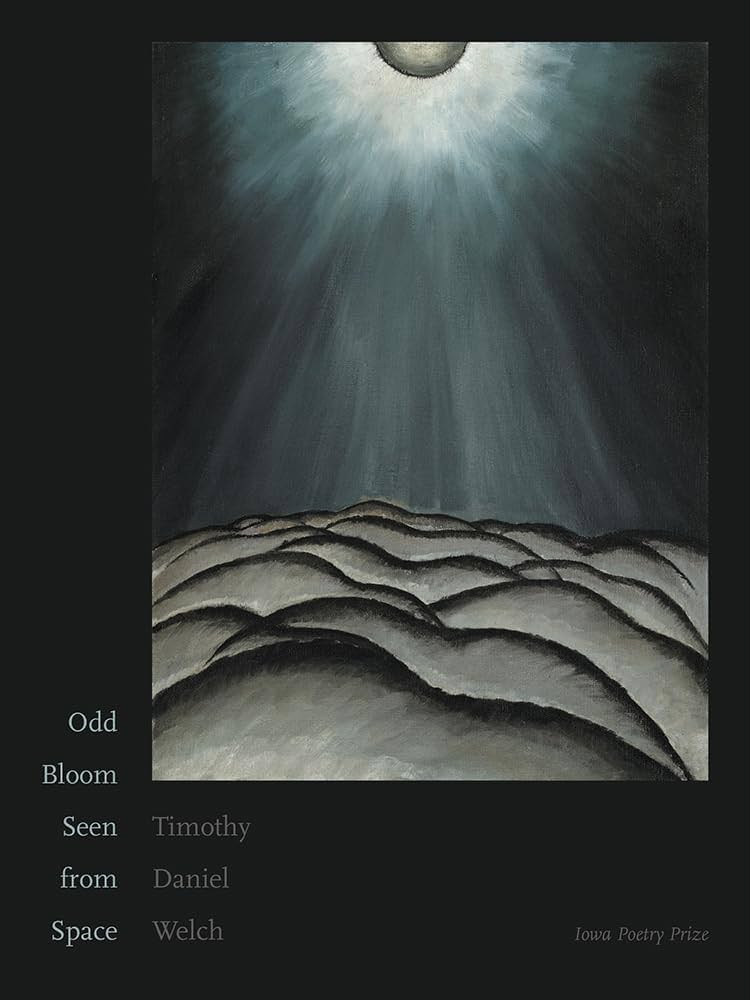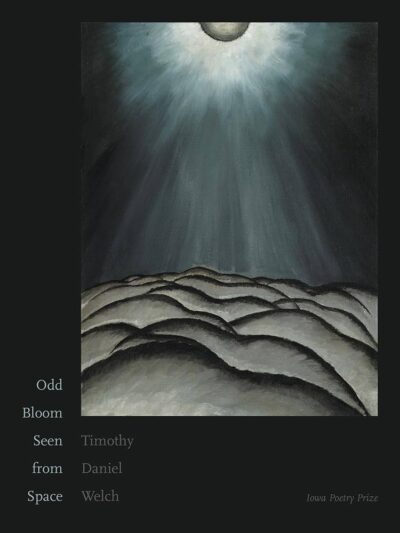
Odd Bloom Seen from Space.
Timothy Daniel Welch. University of Iowa Press: Iowa City, IA. 2017.
This collection’s poems whirl with spirals of allusions, intense intimacy, and heartbreak. They exude a heat that simmers and leaves a reader waiting in awe for the surprise of the next line. Awe is what drives many of the works here, as the narrator absorbs moments of overwhelming emotion, and in these moments, the sense of being overpowered becomes a kind of erasure. It creates such amazement that a strange vanishing occurs, so that the instance, the act, the object has journeyed into a beyond, a hot, blinding light.
Timothy Daniel Welch’s Odd Bloom Seen from Space shines with these flashes, making the reading of every page a kind of holy act. In “Slobs of the Ineffable Go to Evensong,” the first-person narrator attends an Episcopal service where a friend sings in the choir. Upon entering the sanctuary, a sense of awe bubbles up as “love spills innumerably / at loose distances while the church / bears us.” The narrator suddenly senses how the sanctuary “shine[s] upon a dead word: / Welkin. It used to mean a curved sphere like a movie / screen where . . . / the night sky . . . / was projected.” And as the poet reflects “if my ancestors sang and schemed as celestial / bodies,” he realizes “that there’s no welkin / in the 21st century.” The idea, the concept, even the word has vanished, and though the scene creates a moment of enchantment, the loss is intensely felt, all is changing, disappearing, as “the children’s choir looks— / looks nothing like children.”
This theme continues in the poem “Portraits at the Funeral.” In these lines the narrator recalls his grandmother’s brilliant, transcendent artworks: “She painted everything. . . . / ”
. . . The bright vermillion
mesas and creosote of New Mexico, the burnt lakes
where the Sierras overturned the sky,
and these landscapes hung
on her walls like portals, charms
dipped in oil. . . .
In this case, again, a disappearing of what’s awesome transpires, this time done by the artist herself: “[I]t first started with white / paint and the bucket standing / in the bathtub. Every day she’d give a little // ”
brush stroke, painting over her landscapes,
until, moment to moment,
one could not decipher the wall
from the work.
In one of the most powerful pieces in Timothy Welch’s book a father and son miscommunicate on a daily drive together to work in a way that metaphorically captures their entire relationship. The stanzas in “Working for My Father” cinematically offer on several occasions highway roadkill seen from first the son’s and then the father’s perspective. The young man identifies the body of a deer, while the patriarch insists the figure is a racoon’s remains.
These seemingly small deaths hold a big place in the narrator’s psyche as he imagines the amazement of how “At night dreams grow four legs and confront / one another, some move through and // some get stuck listening when the ice / takes them. . . .”
Soon, another kind of erasure occurs as “The following morning the deer was wreathed / in obvious burial snow,” a disappearance in white. And this is not all that becomes more distant. A later phone call from the father captures how the narrator “held / the phone close to [the] ear; his voice, / far away” and then an acknowledgement: “‘That deer was still on the side of the road, // the one I never saw.’” But this admission is incompletely remembered by the father and ultimately rings hollow by the final stanza.
This theme in the collection can also wrestle with wonder and awe in a way that ends in an uplifting kind of erasure. The poem “Bolero” drips with a similar offbeat erotic energy that Ravel’s music has always inspired. In this case, the film 10’s music and star, Bo Derek, is the obsession of a young narrator. He watches her on video incessantly, as she’s “running along a Mexican beach, her one piece flesh / colored swimsuit against oiled, sun-marked skin,” and he becomes worshipful of her every image, “slow motion Bo Derek, at lounge chair Bo Derek, / piña colada Bo Derek emerging from the water.” What pushes him into another level of awe and breaks him from the movie star’s spell comes years later when he encounters a new lover:
and she turned her back to me at the moment she removed
her blouse and bra, pulled my hands to her chest and said
that her breasts were small, and she would understand
if I didn’t want to keep going. Because it never occurred
to me that sex could be such an act of courage . . .
This erasure marks a turning point, a pushing past youthful obsessions and into a fully new adult-universe of loving wonders and passions. This collection strikes with power at the heart of our senses. Ultimately, it takes us on a moving journey through the heart of what makes the world awesome and whole.
–Michael Trammell

